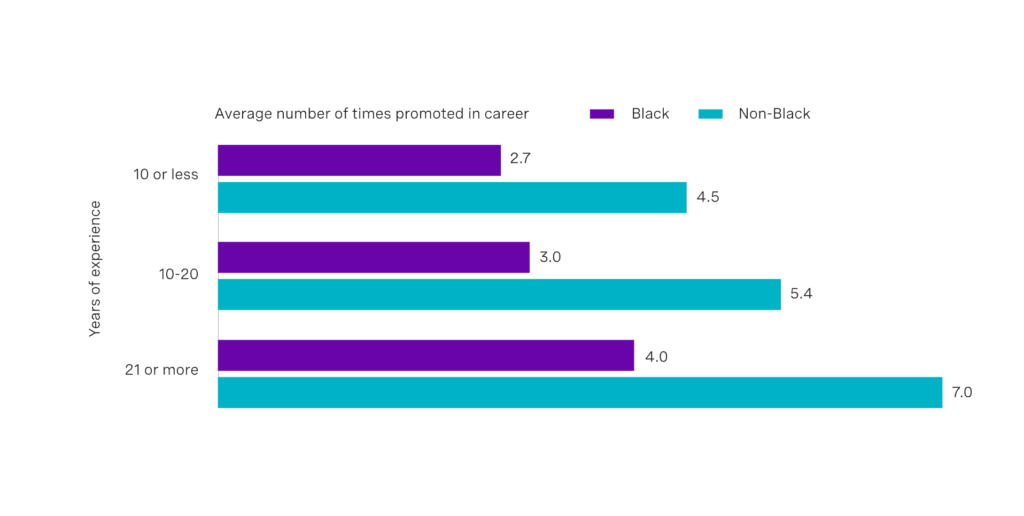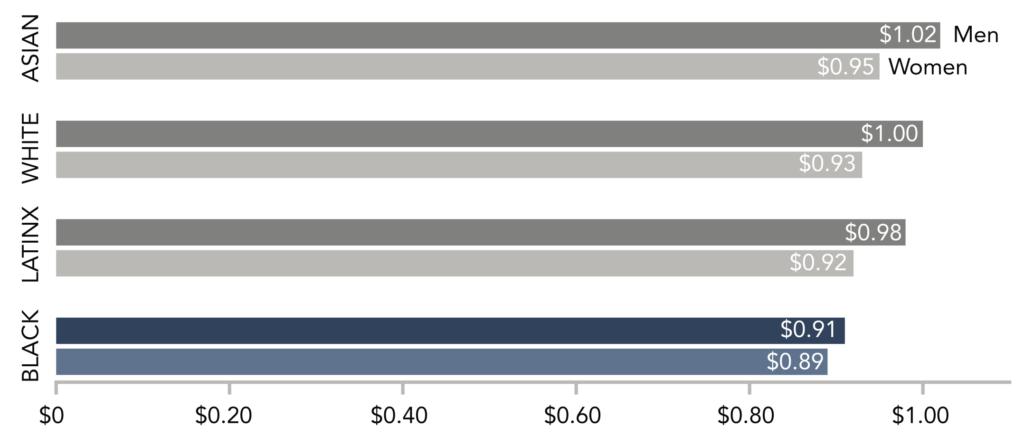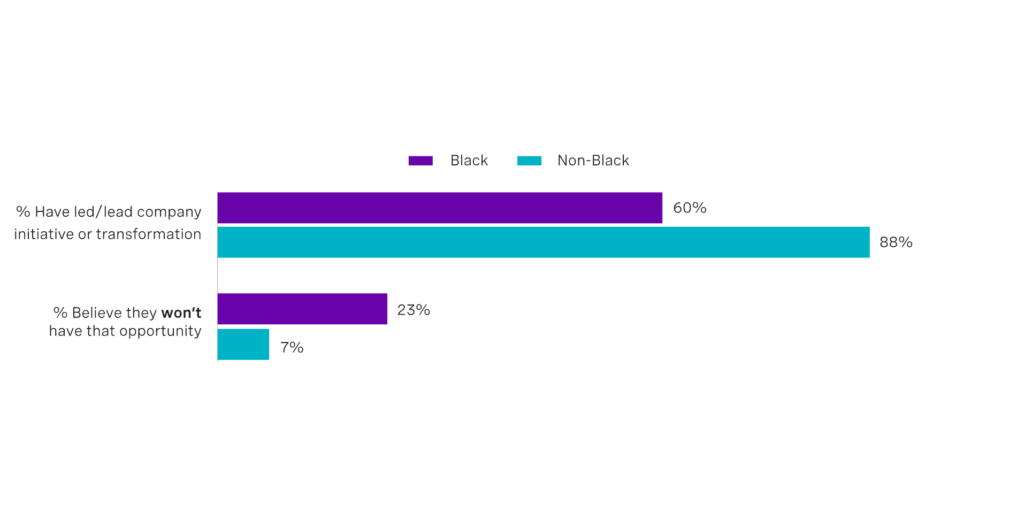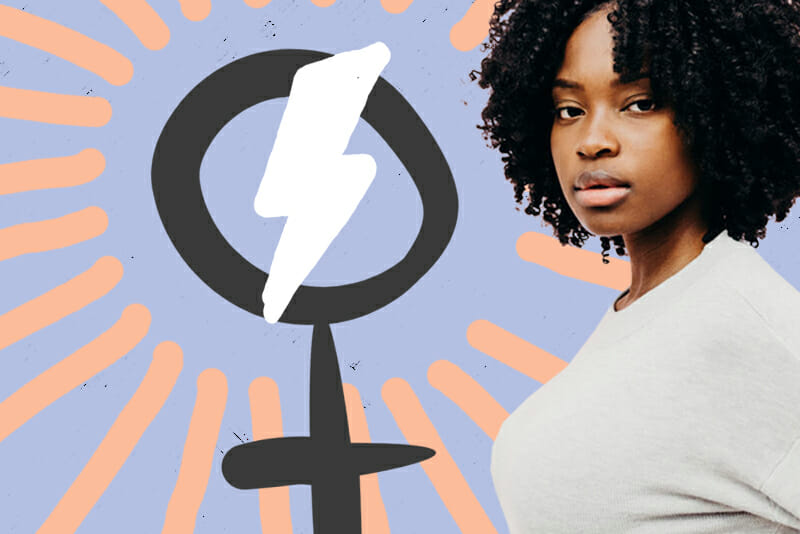Black Women in Tech
Representation matters ✊🏾

Representation matters in all facets of life.
So what does it mean for Black tech professionals who represent only 8% of the tech industry?
For some Black and African American tech workers, underrepresentation and feeling like “the other” is isolating and demoralizing. For others, like Skillcrush alum and Software Engineer Nicole Young, this statistic was a call to action to educate Black folks and create a community of tech professionals who can feel comfortable and seen.
Learn why Black people, especially Black women, are underrepresented in tech, and let us introduce you to the Black-owned and/or led organizations and initiatives that have stepped up to change the ratio.
Table of Contents
- State of Affairs: Black Tech Worker Statistics
- Being Black in Tech: High Turnovers and Short Tenures
- The Come Up: Increasing Black Representation in Tech

State of Affairs: Black Tech Worker Statistics
Let’s roll it back, now. Eight percent in the entire industry? Yep, you read it right.
In 2022, CompTIA reported that only 8% of tech professionals are Black. Comparatively, 12% of the U.S. workforce is Black. To put it in perspective, about 8.9 million people worked in tech in 2022 — about 712,000 tech workers were Black.
CompTIA does not break down the data by gender. However, the National Center for Women & Information Technology reports that women make up 25% of tech professionals, and just 3% of those women are Black.
Though this is an advancement from yesteryear’s Hidden Figures, we have a ways to go.
Black in Tech: High Turnovers and Short Tenures
It’s been well-documented that organizations thrive when diverse ideas are represented in the workplace.
“Diversity can provide insurance, improve productivity, spur innovation, enhance robustness, produce collective knowledge, and, perhaps most important in light of these other effects, sustain further diversity,” according to diversity researcher Scott Page in his book Diversity and Complexity.
Diverse workforces create well-rounded services and products that speak to a wide range of users driving company profits. McKinsey & Company reported ethnically and culturally diverse companies are more likely to outperform in profitability (as much as 36%) than less diverse counterparts.
Profits behoove tech companies to support a diverse workforce, but reality doesn’t reflect this. Professionals in the tech industry experience and observe more unfairness in their work environments than professionals in non-tech industries, according to The Kapor Center for Social Impact and The Ford Foundation. Thirty-four percent of Black survey respondents report leaving their tech job because of unfairness.
Valence and Russell Reynolds Associates cites three challenges that contribute to short tenures and high turnovers that Black professionals must meet and overcome:
- Lack of resources and information
- Biased performance evaluations
- Unequal access
Let’s take a look at each challenge.
1. Lack of Resources and Information
Your network is your net worth. The better connected you are, the more opportunities are available. Though many have capitalized on this unspoken truth across industries, Black professionals have not enjoyed the full fruits of their professional communities.
According to Valence and Russell Reynolds Associates, 78% of non-Black workers with 20 years or less experience know you must know “the right people” to land roles and opportunities. On the other hand, 56% of Black tech talent hold the same knowledge.
This gap in knowledge on its own seems minuscule, but when you consider that promotions and retention are tied to your network, alarm bells ring.
Better access to professional development resources, including sponsors who provide material career progressions (not to be confused with mentors who provide general career guidance), can improve promotion, retention, and morale amongst Black tech talent.
2. Biased Performance Evaluations
You’re only as good as your team, right? Well, what if it’s your team that’s holding you back?
Valence and Russell Reynolds Associates reported that 29% of Black tech workers with 10 to 20 years of experience are satisfied with their level of recognition and pay, compared to 47% of non-Black tech workers. Those same Black professions were promoted half as often as non-Black workers with the same years of experience.

Black tech talent received on average three promotions over 10 to 20 years, while non-Black counterparts of equal experience received more than five promotions in 2022.
Promotions mean not only more opportunities for leadership roles but pay. The State of Tech Diversity: The Black Tech Ecosystem reports that for every $1 a white man, a Black man earns $0.91 and a Black woman earns $0.89 — the lowest of all race and gender groups.

As a result, only twenty-five percent of Black and non-Black tech professionals surveyed believe that their leaders display fairness, objectivity, and transparency. This lack of confidence can be devastating in a team setting, especially when performance and promotions are on the line.
3. Stagnant Upward Trajectory
As you gain more experience, knowledge, and seniority, it’s only right that you gain access to more senior levels of leadership, right? This notion is logical but not completely true for all Black tech employees.
Sixty-one percent of Black tech workers with over 20 years of experience have led major company initiatives. Twenty-three percent of Black tech professionals believe that they will not have the opportunity. Comparatively, 88% of non-Black employees with the same experience have led major company initiatives, and 7% do not believe they will have the opportunity to.

With clear issues outlined, let’s see the different organizations working to increase African American representation in technology (namely Black women in technology) and support the present workforce.

The Come Up: Increasing Black Representation In Tech
Uplifting the Next Generation of Black, Female Tech Professionals
In the digital age, tech education starts as early as preschool, with kiddos tinkering with tablets and smartphones. Thanks to the 1983 Nation at Risk panic, kindergarten marks the start of a formal introduction to the STEM (Science, Technology, Engineering, Mathematics) field.
The Nation of Panic report and subsequent action stressed the importance of STEM education and its role in creating a competitive workforce. Nonetheless, while well-intentioned, the push for STEM education produced mixed results, with students from lower socioeconomic status and specific race and ethnic groups performing below academic standards.
“I think it ought to be extremely disturbing to everyone in the U.S. that science and math performance is not equally distributed across the country. You see huge differences in performance based on race and ethnicity so that Asian and white students do much better on these standardized tests than students of color,” said National Science Foundation member Julia Phillips in an interview.
It surely is disturbing! Various factors should be taken into consideration, including program availability, school resources, and learning disabilities. Nonetheless, the fact of the matter is that students who fall behind in STEM education miss future education and employment opportunities.
Organizations like Black Girls Who CODE bridge the education and opportunity gap. The organization introduces students to computer programming and tech skills as well as equips Black girls and young women with applied skills to become tomorrow’s engineers, developers, leaders, and founders.
Black Girls Who CODE is just one example of companies taking initiative and preparing future Black technologists for the tech industry.
Empowering Black Professionals
We’ve already explained how and why Black tech workers feel unsupported and ousted in the workplace evidenced by high turnover rates and short tenures due to unequal evaluations, promotions, and information.
So how do we support Black developers, in particular? Representation, community, education, and resources.
Representation does matter and shows other Black technologists that it is possible to achieve fulfilling and fair employment.
In Skillcrush alum Nicole Young’s words:
“The funny thing is that I didn’t see a lot of Black representation in tech and so it was beyond what I was concerned about. I didn’t even have an impression of ‘this is what it looked like to be Black in tech’.”
Young’s observation led her to build her personal, tech brand (@nicole.young) to support Black technologists and build community.
“When I first started making content, it was partially because I didn’t see any of us here. I want other people to know — who look like me and have similar experiences — that it’s accessible. There are opportunities and ways to break into this industry. There is so much value to be taken out of it,” said Young.
Nicole uses her platform to share tech learning tips, document her tech journey, and support those breaking into tech. We’re proud of this Skillcrush alum’s success as a tech professional and entrepreneur. Nicole is just one tech professional paving the way and bridging the gap for Black women in tech. And, luckily, she is not the only one.
Black Women Talk Tech empowers Black women tech entrepreneurs and technologists to achieve greatness.
“I believe that everyone is on this earth for a particular reason,” says Black Women Talk Tech Co-Founder Regina Gwynn. “Your perspective, your product, your idea needs to come to market because it’s going to help someone out there. And only your idea, only your approach, only your perspective is the one that matters to a particular market. When someone downplays an idea, they are shutting out a piece of the market that could have been realized.”
The organization equips Black tech professionals with tools and community resources, including conferences, a startup accelerator program, and tech and leadership education opportunities.
Despite systematic hurdles placed in your way, your vision and impact can come to fruition with the right resources and education. Individuals like Nicole Young and organizations Black Women Talk Tech are paving the way.
Illuminating Black Representation in Tech
As Black tech organizations continue to advocate for tech professionals, Afrotectopia highlights the intersections of technology and Black culture, as well as art, design, and activism.
“There’s value in imagination,” said Afrotectopia Founder Ari Melenciano in an interview. “Having the space to imagine among other Black people is inspiring.
View this post on Instagram
The organization is “rooted in collaborative research practices and output for Black agency and empowerment.” Afrotectopia offers K-12 STEAM programs, interdisciplinary continuing education, and networking opportunities.
10 More Organizations Supporting Black Talent
We’ve listed just four organizations that are spearheading the march for technological advancement in the Black community. The following are other organizations to have on your radar:
- Black Code Collective
- Blacks in Technology
- Black Professionals in Tech Network
- Black Men Talk Tech
- Black Tech Nation
- Black Women in Technology
- Blacks United in Leading Technology
- CODE2040
- DevColor
- digitalundivided
- Sista Circle
Representation matters, especially in the workplace. However, Black women are historically underrepresented. Technologists and entrepreneurs like Nicole Young, Regina Gwynn, and Ari Melenciano are amongst the many working to improve Black representation in tech.





